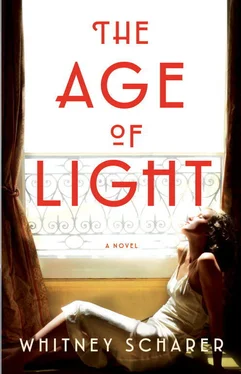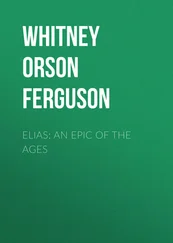At nine thirty the asparagus is on a bed of lettuce with hollandaise drizzled across the platter. Lee picks it up and pushes through the swinging door to the dining room. From the adjacent parlor, the group quiets when they see her. Someone—Seamus, maybe, from the ICA—says, “Brilliant! I’m starving,” and they all come into the dining room. Roland shows them where to sit—this is one of his talents, putting the right people next to one another at a dinner party—and then he comes over to her and takes the platter and sets it on the sideboard. Janie is there, the house girl, whose life Lee makes miserable by rarely letting her in the kitchen, and the girl serves the asparagus and then everyone looks at Lee where she’s still standing by the door.
“Join us, darling,” Roland says, indicating her place at the end of the table nearer the kitchen.
“More to do,” she says, backing toward the door and wondering idly if she’s slurring before deciding she doesn’t really care.
“Sit, Lee,” Audrey says. “You’ve been on your feet all day!”
Audrey’s right. Lee’s feet are aching. She takes off her apron and finds her seat and someone, not Roland, fills her wineglass, and the conversation begins again in fits and starts as people lift the shining asparagus stalks to their mouths and start exclaiming about how good they taste.
They eat and drink and it is not too daunting. Audrey is involved in a long exchange with Bettina about a spring fashion show she just saw. The new look was geometric cutouts, cropped jackets, sheath suits. After a while, Bettina turns to Lee and says, “You’ve always had such a good eye. What do you think of the new Yves Saint Laurent?”
Lee laughs. “Betts, I gave up on all that when I realized how comfortable my army uniform was—you know that. Now it’s just trousers and housecoats for me.”
Roland looks at her. He, like Audrey, knew her when she was modeling, when she could spot a dress from across the room and tell you the designer and the material and the season. That, too, is behind her, and good riddance. If women knew how comfortable army pants were, they’d all be wearing them. During Lee’s last visit to Vogue, she cornered a few young models in the lift and told them how liberating it was to wear men’s pants and not to stuff one’s feet into the equivalent of Chinese finger traps. One of them recognized her.
“You’re Lee Miller, aren’t you?” the girl asked. She towered over Lee—it seemed every year the models got taller—and something about the question annoyed her. In it was Audrey’s prompting: “Be kind to Lee. She’s not the same since—Those things she saw—She was in Germany when they opened up the camps. Horrible, really. We never should have sent her.” So when this girl recognized Lee, the devil in her came out.
“Lee Miller?” Lee said, leaning in so close she could see the girl’s pores, the fuzz of plaque clinging to her straight white teeth. “I heard she died.” The girl looked shocked and then the lift doors opened and Lee got out, the untied laces of her boots slapping along with her as she continued down the hall.
And here Lee is at dinner in boots too, the shirt she has on, formerly covered by her apron, tucked haphazardly into her trousers, with Audrey and Bettina and Roland staring awkwardly, the fashion conversation at a standstill.
To break the silence Lee gets the vichyssoise, which she serves in earthenware tots she and Roland picked up in Bath years ago. Janie helps serve, and Lee shows her what to do so that she can bring out the next few courses, which are prepped and ready when they want them. Each trip to the kitchen is an excuse for more whiskey, though, so Lee doesn’t want Janie to do too much.
Finally, after the scallops and the chicken and the pheasant—all of it as perfect as Lee has imagined it would be, if not as timely—the conversation turns to Roland’s work and gossip about the ICA and the latest exhibition troubles. Seamus’s voice rises above them all, pontificating. Why do fat men always love the sound of their own voices? Lee and Audrey are the only people at the table not connected to the museum, so soon they stop listening and Audrey turns sideways in her chair and says, “Lee?”
Lee is ready—she has been ready—and says, “I have so many ideas, Audrey. Truly. I’m writing again. No more boondoggling.”
Audrey sits back. Looks surprised. “That’s wonderful!”
“I was thinking about that fish dinner I made—you remember, I told you about it? The bluefish? Why not write a piece about art and cooking? Or I could do a piece about foraging. People bring me things, things you probably wouldn’t know you could eat—fiddlehead ferns and different types of mushrooms—a whole piece on that, with photos to match.”
Lee really is slurring now, she can feel it, the words coming from her mouth like puzzle pieces spilling out of a box. Audrey lifts her glass, her wedding band gleaming in the candlelight. In her eyes Lee sees the emotions she expected to see there, pity and embarrassment, her glance sliding away as if she doesn’t really want to be seeing her.
“Lee,” Audrey says, “there’s something I want to ask you.”
Lee moves to stand up. “I should—I need to serve the next course.”
Audrey puts her hand on Lee’s wrist. “It can wait. Roland and I had a nice long chat when he gave me a tour this afternoon, about something that’s been on my mind for months. I want you to write a piece—well, Roland and I want you to write a piece—about your years with Man Ray. A feature. Thirty-five-hundred words. Some of his photos from that time. We think it would do you good to have a big project to focus on. It can go in the February issue. You could interview him if you want, or you could just write it from your perspective, your memories. Our readers will love it. The woman’s touch. They’ve come to love you over the years through all the cooking pieces.”
Lee looks at Roland, who studiously avoids meeting her eye. His shoulders are hitched up to his earlobes and he has that same penitent beagle look on his face that he gets when Lee is yelling at him.
They’ve come to love you through all the cooking pieces. All the fluff Lee’s submitted to Audrey over the past few years, the portrait they commissioned of her in her herb garden, dressed in a goddamn gingham apron. And they do love her! They send her letters. Dear Mrs. Penrose, I’m a homemaker in Shropfordshire and I tried your trifle last night. What a success! All my guests are still exclaiming over it.
Today when Lee was in the kitchen measuring out fenugreek, Roland and Audrey must have been discussing her, cooking up a plan to get her to reengage, come back to herself, do something worth doing.
“I don’t want to,” Lee says finally, her tone petulant even to her own ears.
“Why not?” Audrey looks sympathetic.
Lee reaches for her glass and Audrey’s expression hardens. Without letting her answer, Audrey says, “It will be good for you, Lee. A story with some meat to it. A story only you can tell.”
“I don’t want to, Audrey.”
“Lee… I don’t know how to say it… but it’s this, or we’ll have to renegotiate your contract.”
She knew the words were coming but it doesn’t hurt any less to hear them.
“I’m writing again, truly, Audrey.”
“Then write this. This is what we need. We can’t have… We’re moving away from the domestic section, actually.”
Just then Janie comes over to Lee and whispers in her ear, “Should I serve the dessert, ma’am?”
“No, no—I’ll manage it, Janie,” Lee says.
As the door to the kitchen swings shut behind her, Lee grabs the first clean glass she sees, one of her mother’s teacups with a delicate rose spray pattern, and goes immediately to the Weck jars. The teacup rattles in its saucer as she fills it, so she sets down the saucer and holds the cup in both hands, gulping the whiskey so the fumes rise up and burn her nose.
Читать дальше












